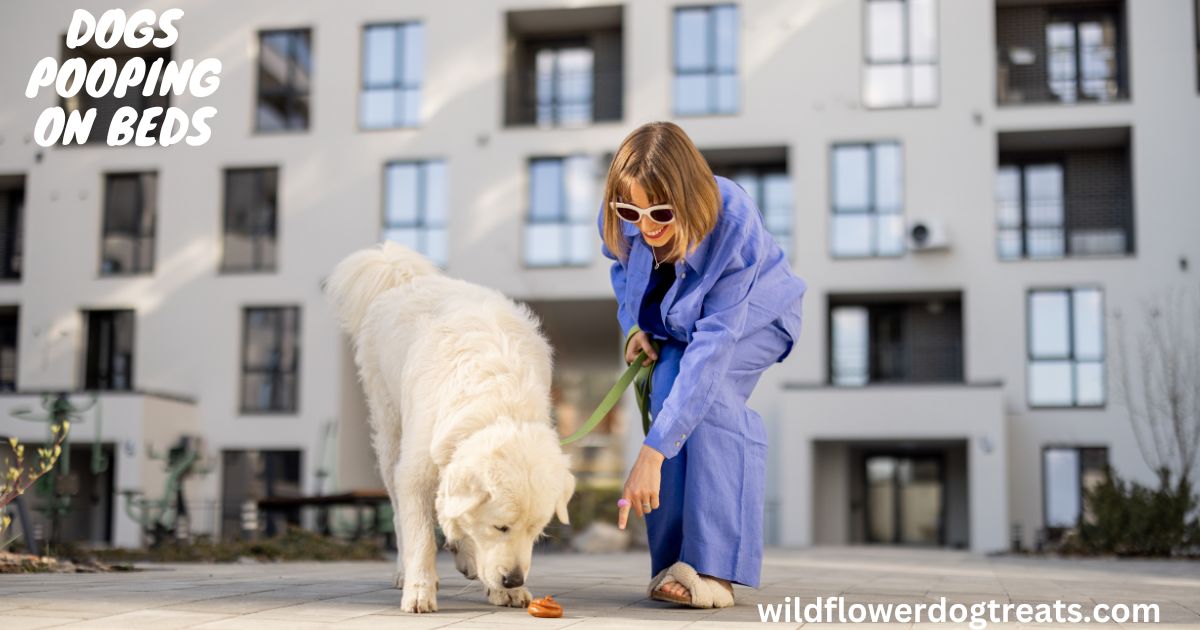Dogs may poop on beds due to anxiety, fear, or excitement. Understanding the cause can aid in preventing this behavior.
Dog pooping on beds can be caused by stress, anxiety, excitement, or fear. Many dogs find comfort in areas that carry their owner’s scent, such as a bed, and may relieve themselves there when feeling anxious or overwhelmed. It is essential to address this behavior promptly to avoid it becoming a habit.
Identifying the root cause and providing appropriate training and support can help prevent dogs from pooping on beds in the future. If the behavior persists, consulting a veterinarian or professional dog trainer may be beneficial in finding a suitable solution.
Why Do Dogs Poop On Beds: Understanding The Behavior
It can be frustrating and confusing when a beloved pet chooses to relieve themselves on the bed. There are various reasons why dogs exhibit this behavior, and it’s essential for dog owners to understand the underlying causes to address the issue effectively. By gaining insights into the reasons behind this behavior, pet parents can take appropriate measures to prevent and correct it.
Underlying Reasons For Inappropriate Elimination
There are several underlying reasons why dogs may choose to eliminate on the bed. These reasons can be broadly categorized into behavioral and medical causes.
Behavioral Causes
Dogs may engage in inappropriate elimination due to behavioral factors such as anxiety, stress, fear, excitement, or marking their territory. Stressful situations, changes in routine, or separation anxiety can trigger this behavior. Additionally, inadequate training, lack of proper elimination spaces, or even attention-seeking behaviors can contribute to this issue.
Medical Causes
Medical issues such as gastrointestinal problems, urinary tract infections, or incontinence can also lead to dogs pooping on beds. It’s crucial for pet owners to be aware of the potential medical reasons behind this behavior and seek professional veterinary help to rule out any underlying health issues.
Behavioral Causes Of Pooping On Beds
Dogs pooping on beds can be a frustrating and perplexing issue for pet owners. Understanding the behavioral causes of this issue can provide insights into why it occurs and how to address it effectively.
Anxiety And Stress-related Behaviors
Anxiety and stress are common behavioral causes of dogs pooping on beds. When dogs experience anxiety or stress, they may engage in inappropriate elimination behaviors, such as pooping on the bed. This could be triggered by separation anxiety, changes in their environment, or fear of loud noises, among other factors.
Territorial Marking Behaviors
Territorial marking can also lead to dogs pooping on beds. Dogs, especially unneutered males, may mark their territory by defecating on the bed to assert their dominance and establish their scent in the environment.
Medical Causes Of Pooping On Beds
Dogs pooping on beds may indicate an underlying medical issue. Understanding the medical causes is crucial in ensuring the health and well-being of your furry friend. Gastrointestinal issues and urinary tract infections are common medical reasons why dogs may exhibit this behavior.
Gastrointestinal Issues
Gastrointestinal problems in dogs such as diarrhea, constipation, or inflammatory bowel disease can lead to accidents on the bed. These issues can cause discomfort and urgency, leading to accidents in inappropriate places.
Urinary Tract Infections
Urinary tract infections (UTIs) can also contribute to dogs pooping on beds. UTIs can lead to increased frequency and urgency to urinate, sometimes causing dogs to have accidents, including defecating in unusual places like beds.
Addressing Behavioral Causes
`Dogs may exhibit undesirable behavior, such as pooping on beds, due to various behavioral causes. Understanding and addressing these causes can help prevent this behavior and promote a healthier relationship between dog and owner. Implementing positive reinforcement and creating a safe environment are essential in addressing behavioral causes of dogs pooping on beds.
Implementing Positive Reinforcement
Using positive reinforcement techniques when addressing a dog’s behavior is crucial in creating lasting change. When a dog exhibits good behavior, such as going to the designated potty area, it should be rewarded with treats, praise, or playtime. Consistently reinforcing positive behavior helps the dog understand what is expected and encourages them to repeat the desired actions.
Creating A Safe Environment
Providing a secure and comfortable environment for your dog is important in preventing unwanted behaviors such as pooping on beds. Make sure your dog has access to a designated potty area, and that area should be kept clean and free of any deterrents. Additionally, ensuring that your dog feels secure and relaxed in their environment can help reduce anxiety and stress that may lead to undesirable behaviors.
Managing Medical Causes
Dogs may poop on beds due to various health issues, stress, anxiety, or territorial marking. It is essential to address any underlying medical causes, such as gastrointestinal problems or incontinence, and provide a safe and stress-free environment for the dog to prevent this behavior.
Consider consulting a veterinarian to identify and manage any medical issues.
Dogs may sometimes poop on beds due to various medical reasons, necessitating meticulous management and veterinary consultation. Identifying and addressing these medical causes is crucial to resolving this issue effectively.
Seeking Veterinary Consultation
If your dog is pooping on the bed, it’s important to consult a veterinarian to rule out any underlying medical conditions. A thorough physical examination and diagnostic tests can help pinpoint any health issues that may be causing this behavior. Common medical reasons for inappropriate elimination include gastrointestinal problems, urinary tract infections, and incontinence. A veterinary professional can provide expert guidance on appropriate treatment and management strategies.
Dietary Adjustments And Medication Options
Diet plays a crucial role in a dog’s overall health and digestive system. Consulting with a veterinarian to make dietary adjustments, such as switching to a specialized diet or adding supplements, can help address gastrointestinal issues that may be contributing to the problem. In some cases, medication may be prescribed to manage specific medical conditions that could be leading to inappropriate elimination. Proper medication and dietary adjustments, under the guidance of a veterinarian, can help address the root cause of the issue and promote better digestive health for the dog. Overall, proactive management and addressing potential medical causes through veterinary consultation, dietary adjustments, and medication options are essential in resolving the issue of dogs pooping on beds. This approach ensures that the dog’s health is prioritized while effectively addressing the problem at hand.

Frequently Asked Questions Of Why Do Dogs Poop On Beds
Why Does My Dog Poop And Pee On My Bed?
Your dog may be stressed or anxious, causing them to pee or poop on your bed. It’s a sign of distress or discomfort.
Why Does My Dog Poop On His Dog Bed?
Dogs may poop on their beds due to anxiety, stress, or a need to mark territory. Regular walks and a consistent routine can help.
Why Do Dogs Occasionally Poop On Beds?
Dogs may poop on beds due to fear, stress, or anxiety. This behavior can also be a sign of doggy distress, especially when something inside or outside the home has upset them.
Is Pooping On The Bed A Common Behavior In Dogs?
While not common, dogs may poop on beds for various reasons such as excitement, playfulness, anxiety, or fear. It’s crucial to address this behavior promptly to prevent it from becoming a habit.
Conclusion
Understanding why dogs poop on beds involves recognizing their potential anxieties or health issues. It’s crucial to address this behavior promptly to prevent recurrence and ensure your dog’s well-being. With patience, training, and perhaps consulting a veterinarian, you can work towards resolving this issue and creating a comfortable environment for your furry companion.




